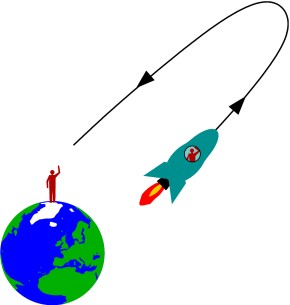Physicist: It depends a little on how you define “experience”, but in general you’ll always experience time moving in exactly the same way. So sci-fi movies where the characters are experiencing slowed-down or sped-up time and are having a hard time moving around because time is all messed up are extremely inaccurate. Outside of conversations that start with “I think it’s kicking in” you’ll never talk to anybody about how time is moving too fast or slow.
The mechanisms behind how our brains work, and by extension how we think, are governed by the same “kind of time” as everything else (known commonly as “time”). So, if time “gets stretched out” by a factor of two, then the way our brain experiences it will also be stretched out by a factor of two. Time would seem to be passing normally, even though everyone outside of the “time bubble” would see you differently. In fact, there’s a few pretty decent sci-fi books about exactly that.
In a nutshell, time always passes at exactly one second per second. Even if time were to suddenly stop and start again, there’s be no way to tell (except to check in with someone unaffected).

The twin paradox, where someone (doesn’t have to be a twin) moves around quickly for a while and finds that less time has passes for them than for their non-moving compatriots.
So what about when physicists, with their non-ironic beards, talk about time slowing down at high speeds according to special relativity? Relativity is a theory about (not to surprisingly) relative movement and its effects. The “twin paradox“, is a real-world example of time genuinely passing at different rates for different observers (although the mechanics of exactly who saw what and why takes a little hashing out). However, without exception, in all of the examples from physics in which time passes at different rates, it’s always someone else’s time that’s affected. Everyone (everything) involved always sees their own time passing normally.
There’s an unfortunate weakness of language when talkin’ physics. When a physicist talks about “experiencing time”, what they mean is time as measured by a clock (or any kind of time measuring device). When your average dude-on-the-street talks about experiencing time, there’s a good chance they’re talking about it in the “a watched pot never boils” kind of way. Different people and creatures, what our different moods and biochemistry, perceive the passage of time differently, but “real time” is immutable.

The noble banana slug and the morally ambiguous basilisk lizard always experience the same amount of time physically, they just get a different amount done over that same time period.
So, if you see some critters moving quickly and others moving slowly, they’re all experiencing the same amount of time, they’re just using it differently. By the way, even the fastest creatures aren’t generating any relativistic effects (not even close), different time rates are all in their head. What’s deeply weird is that different creatures and even different people can genuinely think at extremely different rates! For example, in this link (←) Oliver Sacks describes a dude who sometimes perceives the passage of only one or two seconds during a two hour period.
The picture of the noble banana slug is from here, and the basilisk lizard is from here.







18 Responses to Q: Is it possible to experience different rates of time? If time were to speed up, slow down, or stop, what would you experience?